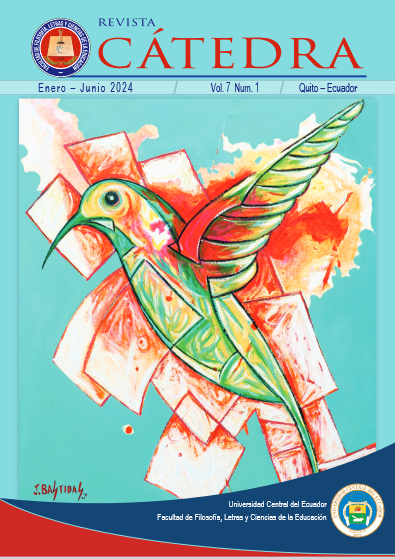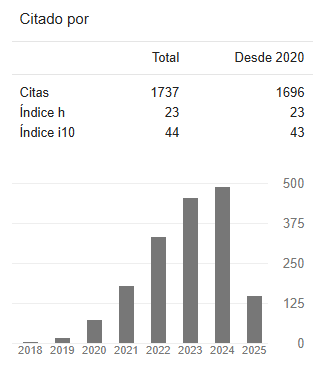The vocational identity of the initial and terminal level in the teaching careers of the Faculty of Philosophy, Central University of Ecuador
DOI:
https://doi.org/10.29166/catedra.v7i1.5204Keywords:
psychological characteristics, initial teacher training, vocational identity, graduate profile, entry profileAbstract
The Faculty of Philosophy, Letters and Educational Sciences faces the challenge of ensuring that students choose a career in which their vocational identity enables their successful completion, so it has the need to have information to assist the decision making of institutional managers. The objective was to characterize the vocational identity of the initial and terminal level of the students of the seven careers of the Faculty of Philosophy of the Universidad Central del Ecuador, period 2022. A conceptual review of vocational identity was carried out and methodologically the research was based on positivism, quantitative approach, ex post facto, cross-sectional, comparative type. The population consisted of 941 students from seven careers of the Faculty. The Vocational Identity scale was used as a research instrument. It was found that there are statistically significant differences in vocational identity between the initial and terminal levels, likewise for the sex variable, men have greater vocational identity than women, the career Pedagogy of Experimental Sciences of Mathematics and Physics, and the career of History and Social Sciences had the highest levels of vocational identity, while the lowest scores of vocational identity were found in the career of Psychopedagogy. It was concluded that vocational identity is affirmed as the levels of study advance. The results will support the establishment of academic strategies to avoid desertions and improve the exit profile of future teachers.
Downloads
References
Andrade Mejía, D., Valarezo Cueva, A. S., Torres Díaz, S., & Sizalima Cuenca, S. (2018, junio 25). Orientación vocacional y elección de la carrera profesional en la Universidad Nacional de Loja. Uniandes EPISTEME. Revista Digital de Ciencia, Tecnología e Innovación, Vol 5, N° 4.
Bohoslavsky, R. (2007) Orientación Vocacional: La estrategia Clínica. Buenos Aires: Nueva Visión.
CEPAL (2020). Educación, juventud y trabajo. Habilidades, competencias necesarias en un contexto cambiante. Editorial. Santiago.
Day C. (2006). Pasión por enseñar: la identidad personal y profesional del docente y sus valores. Madrid: Narcea.
D’egremy, F. (1982). Como descubrir tu vocación. México: Anaya Editores.
Gómez Gonçalves, A., Corrochano Fernández, D., Sánchez Barbero, B., & Martín Pastor, E. (2022). ¿Por qué el alumnado de magisterio escoge la carrera docente? Universidad de Oviedo. Volumen 51, Número 4. https://reunido.uniovi.es/index.php/AA/article/view/17909
González, A., Lobos, C., y Acosta, K. (2023). Motivaciones y percepciones que inciden en la elección de la carrera pedagógica en estudiantes chilenos. Revista Complutense de Educación, 24 (2), 253-263.
González Navarro, I., Rodríguez Gregorich, A., & Hernández Fábregas, J. (2020). La orientación profesional para los estudiantes de preuniversitario desde la Universidad de Camagüey. Luz. Año XIX. (1), pp. 3-14, enero-marzo, 2020. Edición 82. III Época. ISSN 1814-151X. Luz. Año XIX. (1),enero-Marzo, 2020. Edición 82. III Época. ISSN 1814-151X. https://www.redalyc.org/journal/5891/589161654002/html/
Gutiérrez Cabrera, S. (2021, julio 14). La relación entre la identidad vocacional y las variables psicológicas. Repositorio Universitat Rovira I Virgili (URV) http://hdl.handle.Net/20.500.11797/TFG3403.
Hernández R. Mendoza P. (2018). Metodología de investigación. Rutas cuantitativas, cualitativas y mixtas. MCGraw-Hill. México.
López-de-Herrera, M., Herrera-Pérez, M., & Rodríguez_Jara, R. (2020). El diLema entre la formación y la vocación. estudio de caso de docentes ecuatorianos de excelencia. Chakiñan, 43-56.
Matthews, J., Bialocerkowski, A., & Molineux, M. (2019). Professional identity measures for student health professionals - a systematic review of psychometric properties. BMC Medical Education, 19(1), 1-10. http://dx.doi.org/10.1186/s12909-019-1660-5
Organización Internacional del Trabajo. (2023). Perspectivas Sociales y del Empleo en el Mundo Tendencias 2023. OIT.
Pucci, R. B. (2018). Factores que inciden en el proceso de toma de decisión vocacional en jóvenes del interior que migran para continuar estudios superiores. Tesis de Licenciatura, Universidad Católica Argentina, Facultad de Psicología y Psicopedagogía. Disponible en: http://bibliotecadigital.uca.edu.ar/greenstone/cgi-bin/library.cgi?A=d&c=tesis&d=factores-Proceso-Toma-Decision-Pucci.
Romero Ramírez, M. de los Ángeles. (2020, enero 1). Vocación docente como respuesta esperanzadora en contextos de vínculos humanos frágiles. Fundación Koinonía EPISTEME KOINONIA, Vol. 3, Núm. 5, 2020.
Rubio Jiménez, J., & González, M. F. (2018, enero). Proyectando el futuro: Un estudio sobre toma de decisiones vocacionales desde un enfoque narrativo autobiográfico. Forum Qualitative Sozialforschung / Forum: Qualitative Social Research, 19(1), Art. 11, http://dx.doi.org/10.17169/Fqs-19.1.2668.
Santana Sardi, G. A., & Vigueras Moreno, J. A. (2023, marzo 22). Hacia un Sistema Virtual de orientación vocacional | Revista .. Revista Cubana de Educación Superior Vol. 38 Núm. 3. https://revistas.uh.cu/rces/article/view/2334
Vanegas Ortega, Carlos, & Fuentealba Jara, Adrián. (2019). Identidad profesional docente, reflexión y práctica pedagógica: Consideraciones claves para la formación de profesores. Perspectiva Educacional, 58(1), 115-138. https://dx.doi.org/10.4151/07189729-vol.58-iss.1-art.780
Downloads
Published
Versions
- 2024-01-30 (2)
- 2024-01-22 (1)









